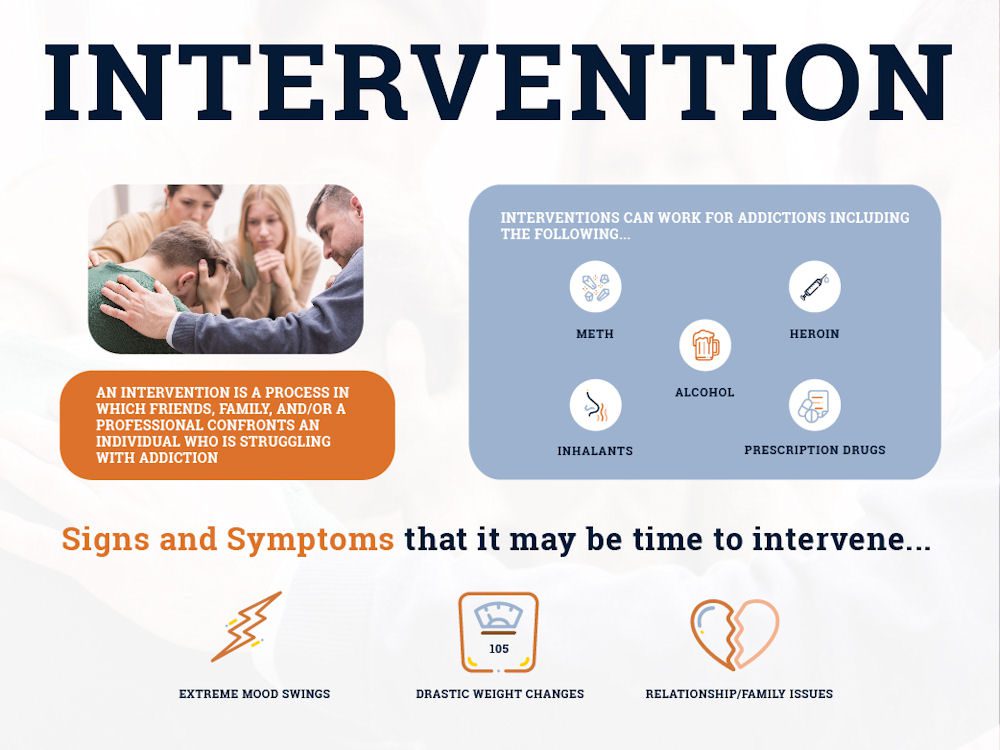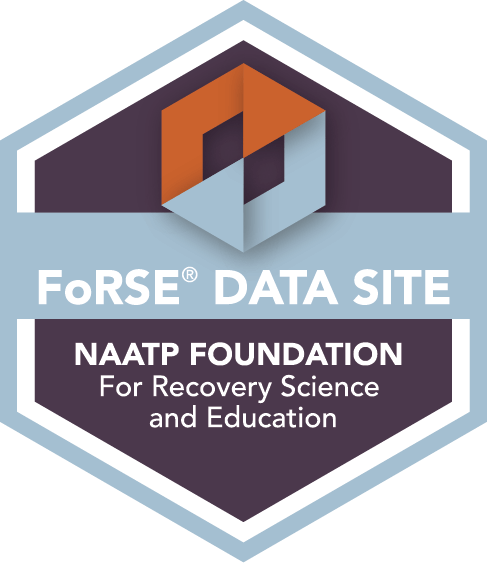There are many reasons why a person may be reluctant to accept help when it comes to a substance use disorder. They might not believe they have a problem, or be afraid to change. Others may not want to face the shame and stigma associated with addiction. Whatever the reason, intervention services can help a person see that they need to get help and make changes in their life.
Addiction treatment enables individuals with a substance use disorder to live life to the fullest, free from the negative consequences of drugs and alcohol. Here at Northern Illinois Recovery Center in Crystal Lake, Illinois, we provide intervention services to precede addiction treatment that can break the cycle of addiction. Learn about intervention services, including when to host an intervention and how to prepare for it, and find resources to support those close to someone struggling with addiction.

The people involved in an intervention lovingly and firmly address the individual on a united front. During an intervention, those who are closest to the individual struggling with addiction share stories about how the person’s drinking or drug use has negatively impacted their shared relationship. This can work for several addictions, including addictions to the following substances:
- Alcohol addiction
- Cocaine
- Heroin
- Meth
- Prescription drugs
- Opiates and opioids
- Benzodiazepines
- Inhalants
The idea is for this to help the addicted individual see how their substance use disorder is affecting their lives and those who are closest to them. Often, when someone is in the throes of addiction, it is difficult to see past the cravings and need to abuse substances. An intervention prompts them to acknowledge that they need help, and entering a Xanax rehab can provide the structured support and professional care necessary to begin recovery.
When are Intervention Services Necessary?
- Extreme Mood Swings: Those struggling with addiction experience changes in their personality and mood, often becoming depressed, anxious, or even paranoid.
- Drastic Changes in Appearance: The physical effects of drug abuse often include sudden weight changes, poor oral health, and unexplained injuries.
- Long Absences: A common sign of substance abuse is abrupt absences from home, work, or school with no explanation of where they were.
- Lying or Deceitfulness: This can include sudden secrecy or abnormal behavior like stealing.
- Breakdown in Relationships: Whether it’s due to hanging out with new people, neglecting responsibilities, or mood instability, the friendships and familial relationships of those abusing substances can deteriorate.
- Unexplained Financial Problems: Those struggling with addiction may struggle to save money and might constantly ask loved ones to borrow it.
- Sudden Inability To Hold a Job: Someone struggling with addiction may get fired often or miss a high amount of work or school.
- Changes in Social Circles: This can include hanging out with people who drink excessively or use drugs.
In addition to the signs of addiction, your loved one may be struggling with a co-occurring mental health condition. This can also cause a person to neglect to seek treatment, requiring the need for an intervention. Unfortunately, mental health disorders are very common in individuals who are experiencing addiction. While this can make treatment a little more intensive, dual diagnosis treatment is available to help a person overcome both disorders.
What Does an Intervention Entail?
There are several types of interventions. An interventionist can help you decide which type will be the most effective for your loved one. Regardless of the type of intervention performed, it will be an approach that best fits the needs of your loved one.
A few different types of intervention include the following:
This method focuses on how addiction affects the family as a whole. In this type of intervention, all members of the family learn about addiction and what they can do to change things. They also establish clear boundaries and consequences for the addict’s behavior. This type of intervention generally takes longer than others, but it can be very effective in healing the entire family.
The systemic family method helps families accomplish several goals. This includes establishing new family norms, boundaries, communication styles, and operating systems. Families also benefit from identifying and developing new healthy coping mechanisms. Additionally, this method involves didactic family therapy and interactive work that examines generational patterns within the family.
The field model of intervention is a newer model developed specifically for families with loved ones who are addicted to drugs or alcohol. This model is unique in that it offers crisis intervention when needed.
The field model of intervention provides resources and support for the family before, during, and after the intervention. If the family believes that their loved one is a danger to themselves or others, the interventionist can help.
The interventionist will assess the situation and decide if a crisis intervention is necessary. If it is, they will work with the family to ensure that the intervention is successful and that their loved one gets the help they need. The field model of intervention provides follow-up support for the family after the conversation.

Steps in the Intervention Process
When your loved one agrees to enter treatment, you will need to present treatment options. It’s best to research, contact, and choose a facility in advance.
If you are unsure what treatment option would be best for your loved one, our admissions specialists can help. Here at Northern Illinois Recovery Center, we offer a range of programs and services for individuals who are ready to overcome addiction, including:
- Drug and alcohol detox
- Residential treatment
- Partial Hospitalization Program (PHP)
- Intensive Outpatient Program (IOP)
- 12-Step Program
- Medication Management Program
- Medication-Assisted Treatment (MAT)
- Dual Diagnosis Treatment
The best addiction treatment option for your loved one will depend on a few different factors. This includes the severity of their addiction, how long they have been struggling, any underlying mental health disorders, and more. Fortunately, our admissions specialists can help you determine which level of care is best for your loved one.
An intervention team will consist of the people who will be confronting the addicted individual. It is important to choose people who are close to the individual and qualified to speak about their experiences with the fallout from their addiction. This group can include friends, family, co-workers, clergy members, and more. Everyone on the team must be committed to taking action and willing to follow through with any aftercare treatment that is recommended.
You might also enlist the help of an interventionist. It’s important to find someone who is qualified and has experience leading interventions. You can ask for referrals from treatment centers, look online, or ask people in similar situations for recommendations.
After you have chosen an interventionist and gathered a support team, it is time to start thinking about the boundaries you will enforce if your loved one refuses treatment. While you do not want to punish your loved one, they need to understand that they must be held accountable for how their actions affect others and themself. Setting firm boundaries can help prevent enabling behavior.
Some boundaries you may set can include not allowing the individual to live in your home or use your car if they continue to use substances.
If you are staging an intervention, you have likely been dealing with your loved one’s behavior for a while. This can be mentally taxing and emotionally draining. It is important that you also seek support for yourself. Talk to friends or family about what you are going through and share how they can help support you. You may also want to consider attending Alcoholics Anonymous or Narcotics Anonymous meetings. These are groups for families and friends of addicts that provide support and guidance on how to deal with addiction.
Intervention Services FAQ
It’s often best to stage the intervention in a neutral, private area where the person struggling with substance abuse doesn’t have any strong emotional ties, such as their own home. It’s important to pick a controlled environment and host the intervention at a time when the individual is likely to be sober. This can help give you and your intervention team more control over the conversation.
The intervention team should consist of four to six people and mainly include those who are close to the individual abusing substances. You might include an intervention professional as well to help moderate the conversation. When choosing the team, consider enlisting the help of those whom you trust to be kind yet firm during the intervention. Don’t include anyone your loved one doesn’t like or may interfere with the conversation.
While some interventions do not work at first, you can increase the likelihood of success by thoroughly planning the conversation. Don’t perform an intervention on the spur of the moment. Research treatment options, inform the intervention team on anything they need to know about the individual’s addiction, and prepare for emotional outbursts during the conversation. Mood changes are a symptom of drug abuse, which may affect how your loved one reacts to the intervention.
Often, the person who is struggling with addiction will go to an inpatient treatment center after an intervention. Inpatient treatment centers provide a safe and structured environment for people to detox from drugs and alcohol and begin their journey to recovery.
After completing an inpatient or outpatient treatment program, it is important to continue to participate in some form of addiction aftercare program. These often include support groups and therapy. This will help the addicted individual stay grounded in their recovery.
Stage An Intervention at Northern Illinois Recovery Center
We also have a variety of aftercare programs to help our clients stay on track after they leave treatment. To learn more about our programs and how we can help, contact us today.






